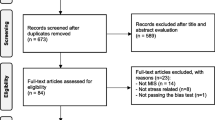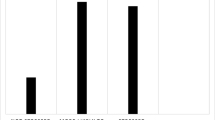Abstract
Background
Non-technical skills are relevant to surgical performance but are difficult to quantify. The aim of this study was to investigate the relationship between self-efficacy, which is a measure of stress-coping ability, and surgical performance.
Methods
Two hundred and sixteen basic surgical trainees were assessed on their performance of three bench model-type open and laparoscopic surgical tasks. They also completed a 10-item General Self-Efficacy (GSE) questionnaire to assess their stress-coping abilities. Their assessment scores were correlated with the GSE scores.
Results
The mean GSE score of 31.39 was higher than the recorded population norms. There was no significant correlation between GSE and surgical performance for open or laparoscopic tasks.
Conclusion
Junior surgical trainees have high self-belief scores, but these abilities are difficult to measure and quantify. More refined methods may be necessary to measure non-technical skills relevant to surgery.


Similar content being viewed by others
References
Parliamentary Report into Patient Safety, London, July 2009. Available at: http://www.parliament.uk/healthcom
Chodhary RK (2004) Qualities of a good surgeon. BMJ 329:314
Anjum SN, Quinn P, Anwar R (2005) Qualities of a good surgeon. BMJ 331:1176
Kohn LT, Corrigan JM (1999) To err is human: building a safer heath system. Institute of Medicine, Washington, DC
Leape L (1994) The preventability of medical injury. In: Bogner MS (ed) Human error in medicine. Lawrence Erlbaum, Hillsdale
Berguer R, Smith WD, Chung YH (2001) Performing laparoscopic surgery is significantly more stressful for the surgeon than open surgery. Surg Endosc 15:1204–1207
Yerkes RM, Dodson JD (1904) The relation of strength of stimulus to rapidity of habit-formation. J Comp Neurol Psychol 18:459–482
Mueller M (2004) Safety lessons taken from the airlines. Br J Surg 91:393–394
Bandura A (1997) Self-efficacy: the exercise of control. Freeman, New York
Bandura A (1994) Self-efficacy. In: Ramachaudran VS (ed) Encyclopedia of human behaviour. Academic Press, New York
Maschuw K, Osei-Agyemang T, Weyers P et al (2008) The impact of self-belief on laparoscopic performance of novices and experienced surgeons. World J Surg 32:1911–1916
Hassan I, Weyers P, Maschuw K et al (2006) Negative stress-coping strategies among novices in surgery correlate with poor virtual laparoscopic performance. Br J Surg 93(12):1554–1559
Yule S, Flin R, Paterson-Brown S, Maran N (2006) Non-technical skills for surgeons in the operating room: a review of the literature. Surgery 139(2):140–149
McCulloch P, Mishra A, Handa A, Dale T, Hirst G, Catchpole K (2009) The effects of aviation-style non-technical skills training on technical performance and outcome in the operating theatre. Qual Saf Health Care 18(2):109–115
Helmreich RL, Merritt AC, Wilhelm JA (1999) The evolution of Crew Resource Management training in commercial aviation. Int J Aviat Psychol 9(1):19–32
ICOSET 2nd international conference on surgical education and training, RCSI, Dublin, 12–14 May 2010. Available at: https://events.rcsi.ie/ei/cm.esp?id=68&pageid=_2RA0UR0QI
Bulstrode C, Hunt V (2003) Selecting the best from the rest. Surgeon 1(6):328–331
Cope DH, Fenton-Lee D (2008) Assessment of laparoscopic psychomotor skills in interns using the MIST Virtual Reality Simulator: a prerequisite for those considering surgical training? ANZ J Surg 78(4):291–296
Gallagher AG, Leonard G, Traynor OJ (2009) Role and feasibility of psychomotor and dexterity testing in selection for surgical training. ANZ J Surg 79(3):108–113
Schwarzer R, Jerusalem M (1995) Generalized Self-Efficacy scale. In: Weinman J, Wright S, Johnston M (eds) Measures in health psychology: a user’s portfolio. Causal and control beliefs. NFER-Nelson, Windsor
Schwarzer R, Bassler J, Kwiatek P, Schroeder K (1997) The assessment of optimistic self-beliefs: comparison of the German, Spanish, and Chinese versions of the General Self-Efficacy Scale. Appl Psychol 46:69–88
Natvig GK, Albrektsen G, Qvarnstrom U (2003) Associations between psychosocial factors and happiness among school adolescents. Int J Nurs Pract 9:166–175
Magaletta PR, Oliver JM (1999) The hope construct, will, and ways: their relations with self-efficacy, optimism, and general well-being. J Clin Psychol 55:539–551
McGrath JE (1976) Stress and behaviour in organisations. In: Dunnette MD (ed) Handbook of industrial and organizational psychology. Rand McNally, Chicago
Staal M (2004) Stress, cognition, and human performance: a literature review and conceptual framework. http://hsi.arc.nasa.gov/publications/20051028105746_IH-054%20Staal.pdf
Wetzel CM, Kneebone RL, Woloshynowych M, Nestel D, Moorthy K, Kidd J, Darzi A (2006) The effects of stress on surgical performance. Am Surg 191(1):5–10
Asken MJ, Raham DC (1983) Resident performance and sleep deprivation: a review. J Med Educ 58:382–388
Leung L, Becker CE (1992) Sleep deprivation and house staff performance: update 1984–1991. J Occup Med 34:1153–1160
Samkoff JS, Jacques CH (1991) A review of studies concerning effects of sleep deprivation and fatigue on residents’ performance. Acad Med 66:687–693
Gallagher AG, Smith CD (2003) Human-factors lessons learned from the minimally invasive surgery revolution. Semin Laparosc Surg 10(3):127–139
McCormick PH, Tanner WA, Keane FBV, Tierney S (2006) Minimally invasive techniques in common surgical procedures: implications for training. Ir J Med Sci 172(1):27–29
Scott-Connor CE, Hall TJ, Anglin BL, Muakkass FT (1994) The integration of laparoscopy into a residency and implications for training environment. Surg Endosc 8(9):1054–1057
Botha AJ, Elton C, Moore EE, Suaven P (1995) Laparoscopic appendicectomy: a trainee’s perspective. Ann R Coll Surg Engl 77(4):159–162
Navez B, Penninckx F (1999) Laparoscopic training: results of a Belgian survey in trainees. Acta Chir Belg 99(2):53–58
MacRae H, Reznick R (2006) Teaching surgical skills—changes in the wind. Med Ed 355:2664–2669
Gallagher AG, Ritter EM, Champion H et al (2005) Virtual reality simulation for the operating room: proficiency-based training as a paradigm shift in surgical skills training. Ann Surg 24:364–372
Luszczynska A, Scholz U, Schwarzer R (2005) The general self efficacy scale: multicultural validation studies. J Psychol 139(5):439–457
Schwarzer R, Born A (1997) Optimistic self-beliefs: assessment of general perceived self-efficacy in thirteen cultures. World Psychol 3:177–190
Scholz U, Gutiérrez-Doña B, Sud S, Schwarzer R (2002) Is general self-efficacy a universal construct? Psychometric findings from 25 countries. Eur J Psychol Assess 18(3):242–251
Carver CS, Scheier M, Weintraub J (1989) Assessing coping strategies: a theoretically based approach. J Pers Soc Psychol 56:267–283
Arora S, Sevdalis N, Nestel D, Tierney T, Woloshynowych M, Kneebone R (2009) Managing intraoperative stress: what do surgeons want from a crisis training program? Am J Surg 197(4):537–543
Yule S, Flin R, Maran N, Rowley D, Youngson G, Paterson-Brown S (2008) Surgeons’ non-technical skills in the operating room: reliability testing of the NOTSS behavior rating system. World J Surg 32(4):548–556
Rafferty JP, Lemkau JP, Purdy RR, Rudisill JR (1986) Validity of the Maslach Burnout Inventory for family practice physicians. J Clin Psychol 42:488–492
Goleman (1998) Working with emotional intelligence. Bantam, New York
Author information
Authors and Affiliations
Corresponding author
Rights and permissions
About this article
Cite this article
Boyle, E., Kennedy, A.M., Doherty, E. et al. Coping with stress in surgery: the difficulty of measuring non-technical skills. Ir J Med Sci 180, 215–220 (2011). https://doi.org/10.1007/s11845-010-0578-z
Received:
Accepted:
Published:
Issue Date:
DOI: https://doi.org/10.1007/s11845-010-0578-z




